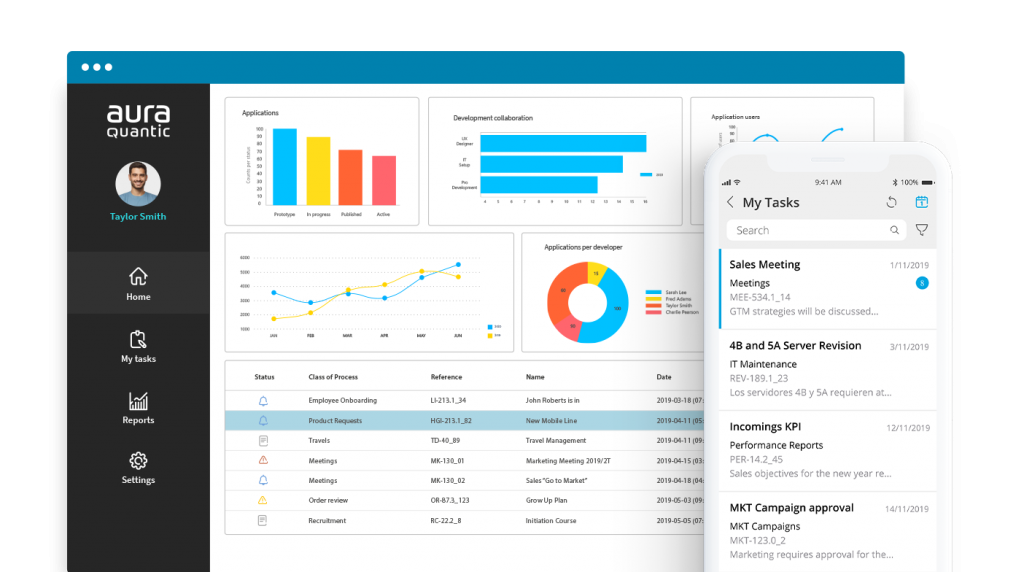The value of data in the business world
Blog: AuraQuantic Blog
Dell’s
“Global Data Protection Index 2020” reveals that organizations manage
an average of 13.53 petabytes of data, an increase of 831% since 2016.
Currently, data
is an important source of economic benefits and is the key that guarantees
success in business.
Financial
markets alone generate between four and five terabytes of data per day that is
used for real-time analysis and detecting problems in business activities.
But not only is
the amount of data generated increasing, so are the ways in which it is
produced. More and more devices are connecting to the Internet and recording
useful information: soil moisture, heart rate, engine performance, etc.
The decrease in
storage costs is making it easier for us to save any type of data, and the fact
of saving it in the cloud is making it easier for us to access it whenever we
need it.
OUR FIRST STEPS
Our ability to
extract data and analyze it has always given us an advantage over other species
on earth. Without data, we would not have acquired the necessary knowledge to
cultivate the land, and we would not have changed our nomadic lifestyle for a
sedentary one and established a society.
We learned by
observing, and we created tools to measure distances, weights, temperature,
etc. We improved so much that we were able to generate surpluses, so some
people in the group began to focus on other tasks such as producing ceramics or
other objects that they then exchanged with the farmer for a portion of that
surplus.

THE DATA MODEL IN COMPANIES
Companies are a
reflection of our evolution in the world and, like us, they need data to keep
moving forward. For years we have applied the method of observation to detect
market needs, and trial and error to gain experience by learning from our own
mistakes.
However, both
methodologies had the common problem of paucity of data. In reality, for a long
time we did not have the tools that would allow us to generate, collect, and
store information effectively. And as a result of this situation our decisions
were based, almost exclusively, on intuition.
It is true that
the intuition / experience binomial has brought great successes to the business
world, but it is also true that these decisions were poorly founded and
entailed risks:
• In 1962 the
Decca record company was looking for groups to promote, and after an audition chose
Brian Poole and the Tremeloes and rejected The Beatles.
• Between 1990
and 1996, twelve publishers did not want to publish Harry Potter, and it was
the young daughter of the director of Bloomsbury Publishing who advised her
father to publish it after reading an excerpt from the novel.
Towards the computerized
business model
Computing has
provided companies with the tools they need to store and analyze data. With process
digitization, organizations today can monitor the status of task execution,
record data, and extract information in real time to make modifications.
Without a doubt, the development of the Internet, especially the World Wide Web, extensive use by the population of mobile devices, and other home accessories with Internet connection, have amplified the process of integration of technology, and today millions of users use the Internet to learn, interact and purchase goods.
We now have
unprecedented capacity to collect data, and companies must learn to analyze this
data to obtain a competitive advantage over competitors.
“Software
innovation continues to spark unprecedented advances that transform the world
around us, empower us as individuals, and grow our economies. Yet the full
potential of this digital transformation can only be realized if we tap the
potential of the data these innovations have unleashed. ”
THE VALUE OF DATA AND THE COST OF BAD DATA
Data alone is
not able to provide us with the value we need, it is often messy, and it lacks
a logical structure that is useful for our analysis.
We need a
strategy that provides value to our data, that takes into account the answers
we want to obtain, and consequently what data we must save, and what questions
we must ask.
This is where the business analyst profile emerges as the person capable of understanding the stories that our disjointed data tell, finding order where we all see disorder, because in the proper correlation of data there may be the patterns that reveal market trends.
Not knowing how
to read the data, and not having the appropriate tools to store and analyze it,
means losing business opportunities.
One of the
objectives of analytical tools related to Business Intelligence is to help us explore our data and discover ways to improve our
competitiveness.
THE VALUE OF DATA: DATA MONETIZATION
“From an economic perspective, making better use of data could lead
to a ‘data dividend’ of $1.6 trillion in the next four years alone. Economists
estimate data-enabled efficiency gains could add almost $15 trillion to global
GDP by 2030. “
Monetizing data
means discovering and leveraging company data for measurable revenue and
opportunities.
But data gains
value when it is processed, and therefore it is necessary to develop a strategy
that suits our needs.
For example,
data from our customers’ purchase history can help the sales and marketing
department establish a buyer profile and create a personalized message that
strengthens the relationship with customers.
But if we
combine this information with geolocation data, Internet searches, movements on
social networks, etc., we can find new habits that allow us to predict new
future trends.
Predicting the
future is within our reach and the data captured by thousands of devices connected to the internet is giving us the information we need.
Today, our weather forecasts are very reliable, but we are also beginning to use these techniques in economics to anticipate movements in the market, employment or inflation. In short, the new analytical tools, in combination with low code platforms that allow us to digitize the data, are enabling us to find order in what was apparently chaos, and are revealing new guidelines, trends and business ideas.
The post The value of data in the business world appeared first on AuraQuantic.
Leave a Comment
You must be logged in to post a comment.








